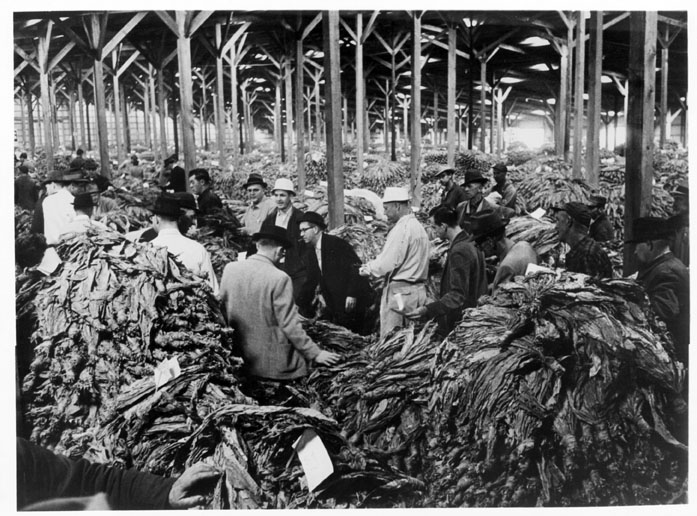Soup kitchens, bread lines and boarded up businesses often come to mind when discussing the Great Depression. The economic turmoil that began in October 1929 would go on to define the 1930s. According to Lou Harshaw’s 2007 book, Asheville: Mountain Majesty, the city and county “lost or owed around $41 million,” when Asheville’s Central Bank and Trust Co. failed in November 1930 (roughly $629 million in today’s dollars or around 15 times the original amount).
But not all was doom and gloom in the mountains of Western North Carolina. On Feb. 9, 1930, The Sunday Citizen informed readers of a mass meeting held at the Battery Park Hotel to discuss the fate of a proposed tobacco warehouse within the city limits. Attendees included members of the Chamber of Commerce, city officials, farmers and constituents of various civic clubs.
In a speech to the group, chamber President W.M. Smathers highlighted recent sales reports provided by nearby Tennessee markets; totals ranged between $1.5 million and $4 million. Because of the financial implications, Smathers stated, “This is one of the most important meetings held in Asheville in a long time.”
The group determined to move ahead with the plan, forming several committees to help raise the $50,000 required to build the warehouse. (Project costs would later increase to $60,000.) Early enthusiasm resulted in a quick $20,000 raised. But subsequent funding proved much harder to come by.
In September, to entice support, Western Carolina Tobacco Warehouse Corp. President Gay Green announced plans to use the future site as a recreation center and convention hall during the offseason. Even with these new incentives, community buy-in was in short supply.
Nevertheless, construction began later that month. “If after we get going, we find the business interests of Asheville are so blind that they cannot see the advantage of this to the community we can stop the work throw up our hands and announce to the world that we are too short-sighted in this community to help ourselves,” Green told the Asheville Citizen-Times in a Sept. 14 report. “We’ve faith that Asheville will see us through.”
Green’s faith was tested, however, as financial support remained elusive. A few days later, Archibald Nichols, secretary and radio spokesman for the Asheville Merchants Association, chastised the community for its unwillingness to get behind the project.
Excerpts from Nichols’ broadcast were featured in the Sept. 18, 1930, edition of The Asheville Citizen. Among his many talking points, the spokesman proclaimed one of the region’s major drawbacks was its lack of confidence in the market. “Some of our native pessimists would not believe the sun would rise tomorrow if they had not seen this take place 24 hours ago,” Nichols declared.
“Asheville people seem to have lost a lot of that fine cooperative spirit that builds cities and increases our population, to make money and enlarge the per capita wealth of our citizens,” he continued. “We have by far too much petty jealousy in our people to accomplish all that we should.”
Following his lengthy criticism, Nichols concluded his broadcast with a plea:
“We have 6,000,000 pounds of tobacco raised in this and adjoining counties easily worth more than a million dollars, and we have the buyers assured for December 2 if we put up a warehouse with 50,000 square feet of floor space. We have $45,000 subscribed of the $60,000 needed. Can we get the other $15,000? We can develop a flourishing Burley tobacco industry in Asheville, selling 10,000,000 pounds in less than ten years, valued around $2,000,000. We haven’t a single Burley tobacco market in North Carolina to sell our own crop of five to seven million pounds.”
That November, Asheville’s banks closed. Despite the financial bedlam that followed, construction and fundraising for the project continued.
On Dec. 10, 1930, the Carolina Tobacco Warehouse opened at Valley and Beaumont streets. In the following day’s paper, The Asheville Citizen reported that thousands attended the warehouse’s opening. The venue, the paper declared, represented many things for the Asheville community. Along with being a new source of income for the region, the site also “typified the predominating characteristic of the people of Western North Carolina of this generation — resourcefulness.”
Editor’s note: Peculiarities of spelling and punctuation are preserved from the original documents.



Before you comment
The comments section is here to provide a platform for civil dialogue on the issues we face together as a local community. Xpress is committed to offering this platform for all voices, but when the tone of the discussion gets nasty or strays off topic, we believe many people choose not to participate. Xpress editors are determined to moderate comments to ensure a constructive interchange is maintained. All comments judged not to be in keeping with the spirit of civil discourse will be removed and repeat violators will be banned. See here for our terms of service. Thank you for being part of this effort to promote respectful discussion.